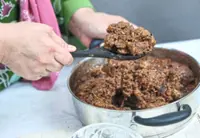
Terengganu Chinese Peranakan Association deputy president Yap Chuah Bin (holding a book) and his wife Song Eng Huat (second, left) explaining to university students in Kuala Terengganu about how the Cheng Mua Lang (sarong-wearing community) has made the East Coast state their home. Photo: Bernama
The Peranakan Chinese community is usually synonymous with the titles baba and nyonya, but in Terengganu, they are better known as Cheng Mua Lang, which means the "sarong-wearing community".
Terengganu Chinese Peranakan Association deputy president Yap Chuah Bin said the Peranakans can be found in Terengganu, Kelantan, Penang and Melaka and in each state, their identity is slightly different although they tend to adopt a large part of the Malay culture.
"The lifestyle practice of Cheng Mua Lang in Terengganu is the same as the Malays. For example, in terms of clothing, women usually wear kebayas and batik sarongs, while men wear pelikat sarongs. That is why they are called the sarong-wearing community,” he said.
In sharing the history of the Peranakan Chinese in the state, Yap said that, according to records, the migration of people from Fujian, China to Terengganu began during the Ming Dynasty in the 16th century. However, some arrived earlier, around the 12th or the 14th centuries, in small, unrecorded numbers.
Interestingly, those who migrated to Terengganu came with their families to earn a living and did not intermarry with the locals.
"There is no intermarriage with local women like the baba nyonya community who arrived earlier in Melaka. Our families often arrange our marriage and we tend to marry cousins or relatives on the mother’s side,” said Yap.
As a result, the lineage of the Terengganu Peranakan Chinese remains unbroken, with some spanning nearly 10 generations, compared to those in Melaka, where many have married local people.
He said that despite practising the lifestyle of the Malay community and communicating largely using the Terengganu Malay dialect, the Peranakan Chinese here still maintain the religious belief of their ancestors, which is Taoism.
"We are very comfortable communicating in Bahasa Malaysia. It’s not that we don’t know how to speak Chinese, but it’s easier to converse in the Terengganu Malay dialect. When we want to speak Chinese, it takes a bit longer as we need to think about how to say it,” he said jokingly.
Similarities can also be seen in the community’s food preparation, as most of their daily dishes are the same as those of the local Malay community, such as ikan singgang, kuih muih, bubur lambuk, ketupat sotong and keropok lekor.
"We also serve nasi kunyit as a tradition to celebrate the 40th day after birth,” said Yap, who mentioned that they also eat with their hands and not chopsticks, and enjoy dikir or traditional Malay dance for entertainment.
Meanwhile, he noted that the rapid socio-economic development that has led to population migration from their home state to more developed areas has significantly impacted the Cheng Mua Lang community, which caused their population to decline.
According to Yap, the original descendants of the community in Terengganu are getting smaller in number, and there are now about 1,000 people remaining throughout the state.
In an effort to preserve the tradition and culture of the Cheng Mua Lang in Terengganu, Yap said the association is actively participating in various conventions and seminars, including those abroad.
"We are one of the 14 active Peranakan Chinese associations in South-East Asia. Every year, we hold gatherings, including overseas, such as in Thailand and Indonesia, to share information and ideas to preserve the legacy of the Peranakan Chinese.
"Every year, we receive support from various quarters to organise festivals related to the Peranakan Chinese culture, and from Oct 2-4, we will be hosting a festival at KTCC Mall. We hope the public can attend to witness our cultural performance and traditions,” he said.
Yap also encouraged students to join their association to gain exposure to the Terengganu Peranakan Chinese and work together to find ways to preserve the culture and tradition of the sarong-wearing community. - Bernama









































